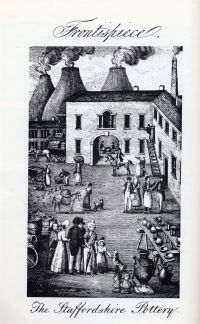Enoch Wood & Sons
|
Enoch Wood (1759-1840), who came to be known as ‘Father of the Potteries’, was a very successful manufacturer who developed an export trade to North America, said in 1843 to be the largest of any Staffordshire manufacturer. Wood was also an enthusiastic antiquarian, who built up a large collection of early Staffordshire wares, parts of which are now in the Victoria & Albert Museum and other British museums. Enoch’s father was Aaron Wood, a gifted modeller who provided many Staffordshire manufacturers with models and moulds for their wares. Enoch similarly trained as a modeller and was apprenticed to the Hanley manufacturer Humphrey Palmer. In 1783, he commenced in business on his own account as an earthenware manufacturer at the Overhouse Works in Burslem, which he operated successfully for some seven years. In the early 1790s, being ambitious and wishing to expand, he entered into partnership with James Caldwell, a local lawyer, who had relatives and clients willing to advance money for the building of a new factory. The factory, at Fountain Place Burslem, was extensive and is said to have incorporated the sites of five earlier factories. It produced a wide range of earthenwares. The partnership also had mining interests, acquiring the Bycars Colliery in Burslem to provide fuel for firing the ovens. Wood’s partnership with Caldwell was dissolved in 1818, enabling Enoch to bring his sons into partnership. The ending of the Anglo- American War in 1815 saw a substantial increase in earthenware exports to the United States, particularly by the larger manufacturers, who tended to employ their own agents in America to market their wares. Blue printed earthenware formed a substantial part of this increased trade and many examples of Wood’s wares can be found today. Enoch died in 1840. His confidential clerk, named Kemp, who is thought to have played an important part in running the business, died soon after, in 1841. 1842 was a time of depression in America: this combination of circumstances, probably coupled with a desire by some of the sons to take money out of the business, led to its decline and eventual closure in 1845. The factory premises were sub-divided and subsequently operated by several other firms. |
|


